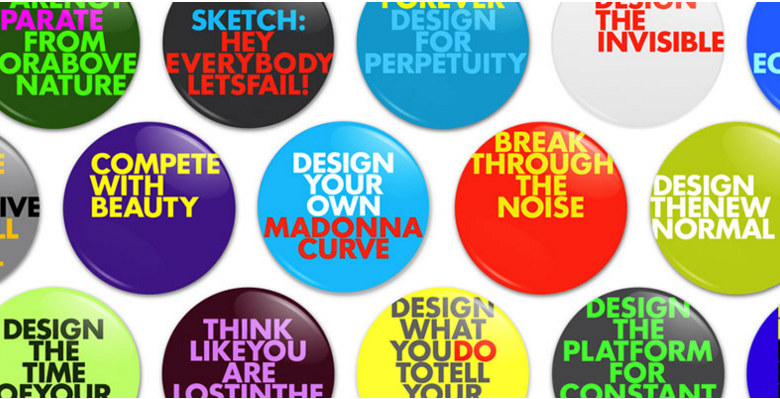To understand, just a little, about legendary designer and thinker Bruce Mau, consider for a moment this idea he touts as part of his Massive Change Network:
“Contrary to popular opinion, most design is not visual.”
Instead, Mau contends, “design” is a way of thinking about how “systems work, how they don’t work, and how they could be re-imagined and re-engineered to function at the highest level.” In other words: Design is about disruption.
Trained as a graphic designer in his native Canada, Mau has spent much of the last decade promoting his notion of design thinking as a way to change the world, inspiring everything from art exhibits—like the one currently on display at the Philadelphia Art Museum—to corporate restructuring to solving civic problems. His “Incomplete Manifesto for Growth” is like an Oblique Strategies for the corporate set, offering 43 pieces of opaque advice meant to inspire change and growth. Like:
“Drift.”
“Read only left-hand pages.”
“Avoid fields. Jump fences.”
Beyond the tao-like aphorisms, Mau’s way of thinking may have a concrete impact on businesses. He cites a recent study that found that companies that emphasize design grew 299 percent between 2003 and 2013, compared to the S&P 500, which grew just 75 per cent.
“When you’re trained as a designer, you learn that you’re not an expert going in, so you question absolutely everything,” says Karin Copeland, a former industrial designer who runs the Chamber of Commerce’s Arts & Business Council. “Design thinking says that every business has to question what they’re doing and why they’re doing it. They won’t survive if they’re not disrupting themselves as individuals and as an organization.”
Tomorrow morning, Mau will bring his principles of design thinking to help Philadelphia solve pressing civic problems, at 24HRS2 Massive Change, an Arts & Business Council forum that will also feature a panel of local experts, including Philadelphia Citizen Board Chairman Jeremy Nowak; Jefferson University President and CEO Stephen Klasko; Natalie Nixon, Director of the Strategic Design MBA program at Philadelphia University; Matt Erdely, associate creative director of Here’s My Chance; and Christopher Korsh, healthcare designer for architecture firm HOK.
Mau’s presentation will focus on the 24 most important aspects of his method for enacting change in seemingly unchangeable systems. The forum is part of a Mau celebration that centers around the Philadelphia Art Museum’s “Work on What You Love: Bruce Mau Rethinking Design,” an exhibit and exploration of his work that also includes several workshops around town with the design thinker.
It is also part of a new focus for the Arts & Business Council, which has started to emphasize the way art and creative thinking can impact the city’s corporate world—not just the other way around. “For years, we were all about what can business people do for arts organizations,” Copeland says. “Now we’re asking, ‘What can creative people do for the business community?’”
This fall, the Council held a series of “Creative Exchanges,” bringing together managers from traditional companies—Philadelphia Gas Works and large accounting firms, for example—with artists and other creative thinkers to help them understand how to become design thinkers. One session had 60 business leaders doing improv with Pig Iron Theater Company; another involved painting. “The idea was to get them looking at everything they do differently, how to problem-solve differently,” Copeland says.
Which is, after all, the essence of Bruce Mau. As he puts it:
“We Each Have the Power to Inspire
To inspire we must do two things: First, be open to possibility. Second, live with purpose and ideals. To inspire, everything we do—how we use energy, how we produce things, how we conduct daily living—must be measured against our purpose and ideals. Where there are contradictions, we must be open about them, and work toward resolving them. The primary responsibility of a designer is to inspire, to galvanize a group into envisioning the future and moving toward it in a systematically creative and productive way. This approach allows us to take on things we don’t know how to do—and that no one else knows how to do, either.”
Header Photo: Philadelphia Museum of Art



